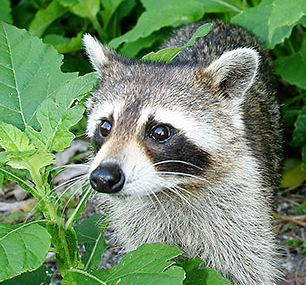

Raccoons Control Toronto
Raccoons find habitat only in Americas, most commonly raccoons are harmless and nocturnal except when breeding or caring for their young.

The raccoon is a stocky mammal ranging from 2 to 3 feet in length, weighing 10 to 30 pounds. Raccoons are great climbers, able to ascend trees of any size as well as great swimmers and runners.
Free Estimate
Damage caused by Raccoons
In urban areas raccoons are usually more of a nuisance then a cause of serious economic damage. However, raccoons may contaminate feed, seed and livestock supplement with their feces and urine. Raccoons may also cause damage to buildings, ripping off shingles, facial boards, sidings to reach food sources or grain, wall damage wall spaces or chimneys. Raccoons are able to climb chimneys and use them as access ways.
In rural areas raccoons are a cause of damage to landscapes and field crops, as they commonly feed on strawberries, peals, potatoes and sweet corn. Raccoons also attack poultry and bring down birds as large as turkeys. Raccoon predation signs include: cases with missing heads, bites on the back, torn necks and breasts, and feeding on breasts. Cain Pest Control offers a range of effective Toronto raccoon control services.
Raccoons commonly feed out of garbage bins. In commercial areas commonly entire families of raccoons are found in waste compactors or garbage bins.
Most Common Infectious Diseases Spread by Raccoons
Raccoons are susceptible to a variety of infectious agents including: bacteria, viruses and parasites. Exposure of household pets and livestock to raccoons is hazardous and highly recommended against by veterinarians. Raccoons are known to spread bacterial diseases as leptospirosis, the transmission of which occurs through contamination of feed or water by urine. Raccoons are also a common spread of bacterial infections as listeriosis, yersiniosis, pasteurellosis, and tularemia.
In addition, Raccoons are known to spread viral diseases as rabies, canine distemper, raccoon parvoviralenteritis, infectious canine hepatitis, and pseudo rabies. Canine distemper is the most common viral disease carried by raccoons. Raccoons are a known spread of disease, and that fact alone is reason enough to procure a Raccoon Control procedure.
Raccoon Removal and Raccoon Control Toronto Methods
Cain Pest Control are experts in Toronto Raccoon Control. Some of the preservation measures include securing waste, livestock feeds and licensed trapping, physical capture and relocation. If your raccoon infestation is mild or moderate, Cain Pest Control will be able to effectively perform Toronto raccoon control for you and rid of the nuisance brought by raccoons.
Contact Cain Pest Control for a free consultation or for more information about Wildlife Control in Toronto.
